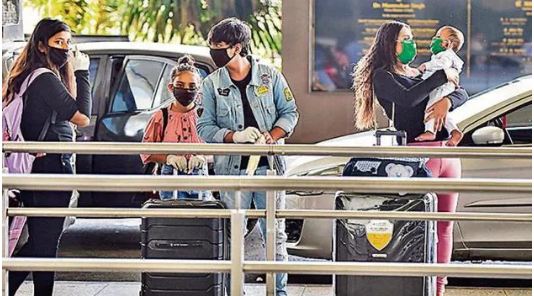WAPASI: During the Covid-19 lockdowns several lakh Indians, including Goans working in the Gulf, have been forced to return to India. Even now Saudi Arabia does not permit Indians to come in out of fear that they will bring in the Delta variant of covid-19.
By Arwa Youssef
The United Arab Emirates which are part of the Gulf countries offer permanent residency only to highly educated, wealthy foreign nationals, and their families. Sharukh Khan may become a citizen but not your ordinary Indian labor who go to the Gulf countries for employment.
The United Arab Emirates (UAE) recently announced a plan to extend citizenship opportunities to highly-educated, skilled, or wealthy foreign nationals and their families. Unfortunately, the country’s citizenship law still leaves out other groups, including children born to Emirati women and foreign fathers, and stateless people.
Increasing pathways to citizenship is good investment for a country whose population consists of nearly 90 percent foreign nationals, most of whom are part of the UAE’s low-paid workforce. However, the government’s new citizenship mechanism is designed to attract an elite set of foreign nationals. It allows for UAE officials to nominate foreign nationals for citizenship using criteria mostly related to academic, entrepreneurial, or financial status.
People in the UAE have taken to social media to point out the glaring hypocrisy of the new plan and demand citizenship for all children of Emirati mothers.
Emirati women continue to face discrimination in passing nationality to their children compared to Emirati men. The UAE’s nationality law provides that children of Emirati men are automatically entitled to UAE citizenship; however, children born to Emirati mothers and foreign fathers are not.
Emirati mothers can apply for citizenship for their children provided their child has lived in the UAE for six years. However, according to some mothers, the application process can be confusing and it can sometimes take years to receive a response. When the child turns 18, they can apply themselves. But even then, they can wait years with no answer.
Others on social media have raised the plight of the country’s bidun (stateless) population, who, without UAE citizenship, face serious obstacles to accessing health care, employment, and university scholarships. Children of stateless couples have no path to citizenship, regardless of how long their parents have lived in the UAE. Many bidun individuals in the UAE trace their origins to nomadic communities or immigrants living there before the country was formed in 1971, and who failed to register for nationality at the time.
The UAE is free to attract foreign investment into the country by offering the prospect of Emirati citizenship, but it should also end gross discrimination regarding citizenship for children of Emirati women and stateless groups. It is time to recognize them as Emirati nationals on an equal basis.
Arwa Youssef is a pseudonym used to protect the identity of a Human Rights Watch staff member.
Coutersy: www.hrw.org
